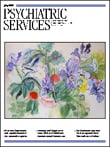On the Stigma of Mental Illness: Practical Strategies for Research and Social Change
Numerous studies have documented the deleterious effects of stigma on the lives and treatment outcomes of individuals with mental illness. Many studies report the effects of stigma to be more debilitating than the illness itself. Little attention, however, has been paid to the mechanisms by which this stigma is maintained despite scientific understanding of these illnesses as brain disorders. One notable exception is the work of the Chicago Consortium for Stigma Research, which has been examining the nature and impact of stigma on the experience of mental illness for several years in order to develop interventions to improve awareness of the nature and experience of serious mental illness.
On the Stigma of Mental Illness is a compilation of the consortium's research on stigma and mental illness that details the processes that create and perpetuate stigma and offers recommendations for its mitigation. Topics range from the history of the study of stigma and mental illness to a discussion of the relevant methodology used to examine mental illness stigma and analyses of the consequences of and remedies for this problem. Corrigan and his colleagues deliver a useful digest packed with detailed reviews of research along with excerpts of autobiographical accounts of individuals' experiences of mental illness stigma.
Several aspects of the book are particularly relevant for clinicians and clinical instructors. Chapter 3, for example, presents first-person accounts of stigma and reviews autobiographical accounts of self-stigma, public stigma, and stigma from mental health professionals. It also relates stories of patients' families' experience of stigma and gives suggestions for helping patients and families cope with stigma. The book also offers suggestions for combating stigma with chapters such as "Strategies for Assessing and Diminishing Self-Stigma," "Dealing With Stigma through Personal Disclosure," and "Changing Stigma Through the Media."
One limitation of the book, however, is the minimal attention given to the interplay between stigma, prejudice, and discrimination. Little attention is given, for example, to the development of prejudiced attitudes or discriminatory behaviors as a result of stigma. This focus on stigma alone creates a sense that the problem is mainly one of a "misunderstanding" and does not link it to the much more damaging phenomena of prejudice and discrimination. Discrimination, after all, is responsible for reduced access to housing and employment opportunities, inappropriate incarceration for symptom-related behaviors, and inadequate access to health insurance benefits for persons with serious mental illness.
Another limitation is the book's primarily academic tone. Although the authors surely intended to present the issue of stigma and its research with the scientific seriousness it deserves, a detached ring to the material does not match with the intensity of the problem of mental illness stigma. Research has found, for example, that given the choice, individuals would prefer having to publicly admit they had served time in prison over admitting a mental illness ( 1 ). More than just an interesting sociologic phenomenon, mental illness stigma is a significant barrier to service utilization and responsible for wide-spread discrimination, even among health and mental health professionals. A more urgent tone to the suggestions for change, for example, would have been more reflective of the pain caused by mental illness stigma.
This book would be of interest to clinicians who are interested in attending better to their patients' stigma-related difficulties. It would also make a useful complement to a course on psychopathology or treatment planning to challenge new clinicians to use a systems perspective to treat the consequences of serious mental illness.
On the Stigma of Mental Illness is an interesting account of a serious problem. It is an important reminder to mental health professionals that we have an obligation not only to treat individuals with serious mental illness but also to correct misperceptions about this class of brain disorders and mitigate the damage caused by stigma, prejudice, and discrimination.
1. Lewis JA, Lewis M, Daniels J, et al: Community counseling: Empowerment Strategies for a Diverse society, 2nd ed. Pacific Grove, Calif, Brooks/Cole, 1998Google Scholar



